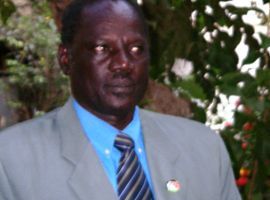Sudan partners disagree over national security bill
December 2, 2008 (KHARTOUM) — The Sudan people’s Liberation Movement (SPLM) said it had reached agreement with the National Congress Party (NCP) on the Law of the press and publications, yet it also confirmed differences with its partner in the unity government on three points in the National Security bill.

Minister Makuei told the reporters that the two partners reached an agreement on the Press and Publications Act which gives the Press Council powers of control and accountability on the press, provided that the Council be elected by journalists and publishers.
However he confirmed divergences with the NCP on three points included in the National Security Act. The disputed issues are: the appointment of the National Security Service Director, appointment of his deputies, and the power to arrest.
Makuei said the SPLM believes that the president should appoint the Director of National Security after consultation with the First Vice President and approval by General Prosecutor but the NCP views this position as interference in the president’s exclusive authority.
The second point of divergence is that the SPLM has proposed the appointment of only one deputy to the Director of National Security, while the NCP is demanding a number of deputies.
The third issue which is considered as essential by his party and can not be resolved, according to GOSS minister, is the power to arrest. The SPLM emphasises that only the prosecution has the right to arrest while the NCP maintains that the National Security Service can also exercise this power.
The southern Sudan ruling party is expected to discuss the disputed issues during a meeting of its political bureau in Juba on Wednesday.
(ST)

Abuoi Jook
Sudan partners disagree over national security bill
This press conference by SPLM Minister for Legal Affairs and Constitutional Development shows clear stand of SPLM party on National issues downplayed by NCP.
This’s a high time that SLPM stand up for mistreatment of media staff and restriction of publication by NCP Security agents. It’s great that NCP accepted freedom of press law and to be controlled by press council elected by journalists and publishers.
The issue of three disputed areas of the National security Law is of great concern if Sudan needs to be a democratic nation. I thanks the minister for having pressed out the position of SPLM party regarding this issue that the director of national security service be appointed by president with the consultation of 1st vice president and later be approved by General prosecutor. It’s good that SPLM opposed to many deputies as there is no neason for them being many instead of one.
National security service should have no mandate to arrest with out prosecution. these are simple clear stands that splm party have called for sudanese to support so that they feel secure and free in their nation, not being harassed by NCP agents. chair up GOSS Government, chair up SLPM PARTY!
Baggaran
Sudan partners disagree over national security bill
The right to arrest needs to be resolved as the SPLM says.
The Security services use of power without accountability is a clear break of human rights.
Majok junior
Sudan partners disagree over national security bill
It was really injustic and gross voilation of human rights to arrest journalists,it shown that the justic system in Sudan is totally corrupt,it’s really a jok.NCP should stop harrassment and intimidation of its citizens and arrange the powers respectively and also abolish such an interferences of government institutions to one another.By Majok Junior.